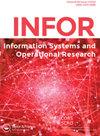On the impact of deep learning-based time-series forecasts on multistage stochastic programming policies
IF 1.1
4区 计算机科学
Q4 COMPUTER SCIENCE, INFORMATION SYSTEMS
引用次数: 4
Abstract
Abstract Multistage stochastic programming provides a modeling framework for sequential decision-making problems that involve uncertainty. One typically overlooked aspect of this methodology is how uncertainty is incorporated into modeling. Traditionally, statistical forecasting techniques with simple forms, e.g. (first-order) autoregressive time-series models, are used to extract scenarios to be added to optimization models to represent the uncertain future. However, often times, the performance of these forecasting models are not thoroughly assessed. Motivated by the advances in probabilistic forecasting, we incorporate a deep learning-based time-series forecasting method into multistage stochastic programming framework, and compare it with the cases where a traditional forecasting method is employed to model the uncertainty. We assess the impact of more accurate forecasts on the quality of two commonly used look-ahead policies, a deterministic one and a two-stage one, in a rolling-horizon framework on a practical problem. Our results illustrate that more accurate forecasts contribute substantially to the model performance, and enable obtaining high-quality solutions even from computationally cheap heuristics. They also show that the probabilistic forecasting capabilities of deep learning-based methods can be especially beneficial when used as a (conditional) sampling tool for scenario-based models, and to predict the worst-case scenario for risk-averse models.基于深度学习的时间序列预测对多阶段随机规划策略的影响
多阶段随机规划为包含不确定性的顺序决策问题提供了一个建模框架。该方法的一个典型的被忽视的方面是如何将不确定性纳入到建模中。传统上,采用简单形式的统计预测技术,例如(一阶)自回归时间序列模型,用于提取场景,然后添加到优化模型中,以表示不确定的未来。然而,通常情况下,这些预测模型的性能并没有得到彻底的评估。受概率预测研究进展的启发,我们将一种基于深度学习的时间序列预测方法引入到多阶段随机规划框架中,并与传统预测方法对不确定性建模的情况进行了比较。我们在一个实际问题的滚动视界框架中,评估更准确的预测对两种常用的前瞻性政策(确定性政策和两阶段政策)质量的影响。我们的结果表明,更准确的预测对模型性能有很大的贡献,并且即使从计算成本低的启发式方法中也能获得高质量的解决方案。他们还表明,当将基于深度学习的方法用作基于场景的模型的(有条件的)采样工具时,基于深度学习的方法的概率预测能力尤其有益,并且可以预测风险规避模型的最坏情况。
本文章由计算机程序翻译,如有差异,请以英文原文为准。
求助全文
约1分钟内获得全文
求助全文
来源期刊

Infor
管理科学-计算机:信息系统
CiteScore
2.60
自引率
7.70%
发文量
16
审稿时长
>12 weeks
期刊介绍:
INFOR: Information Systems and Operational Research is published and sponsored by the Canadian Operational Research Society. It provides its readers with papers on a powerful combination of subjects: Information Systems and Operational Research. The importance of combining IS and OR in one journal is that both aim to expand quantitative scientific approaches to management. With this integration, the theory, methodology, and practice of OR and IS are thoroughly examined. INFOR is available in print and online.
 求助内容:
求助内容: 应助结果提醒方式:
应助结果提醒方式:


